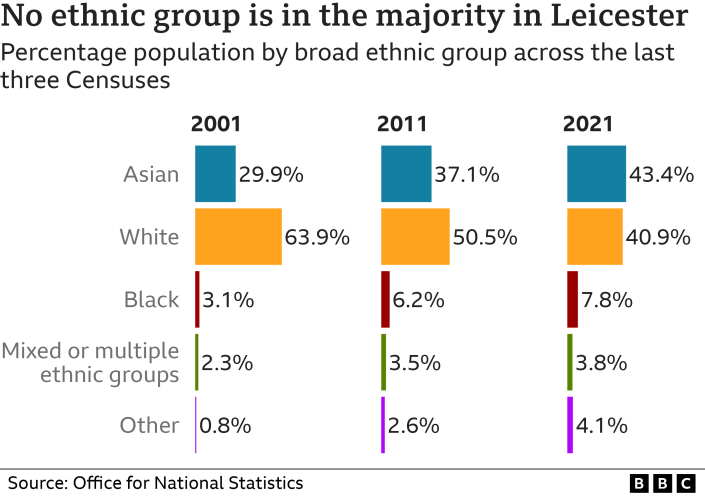Leicester has become one of the first cities in the UK where people identifying as white are no longer the majority, the latest census data shows.
Figures from the Office for National Statistics (ONS) have revealed 41% of the city described themselves as white – the lowest of any city in the UK.
A total of 51% of the city said they were white when the data was last captured by the ONS in 2011.
BBC News has spoken to four people in Leicester who have welcomed the news.
‘I feel privileged to live in Leicester’
Dance teacher Demi Essex, 29, was born and raised in the city and is from a biracial family – her dad is white British and her mum is half British and half Bajan.
She says her mixed heritage has meant she has always appreciated Leicester’s different cultures and is proud of its new status.
“It allows you to not only be educated in that culture but also experience and understand how [other cultures] live, how they eat,” she says.
“My grandad would always cook Caribbean cuisine and he would always tell us to go to the Caribbean carnival so I always had that nice side. It’s just great to embrace both sides.
“I feel privileged to be in a city that holds so much diversity and inclusivity as well.”

She says she faced a few issues at school as a result of being mixed race.
“There were always a few identity issues,” she says. “You would always have cliques and I never knew which clique I belonged to.
“I wouldn’t get bullied but there were a lot of questions.
“I have two brothers and one sister and they are fairly light-skinned so going through school, [I would get asked] ‘Are you sure you are brother and sister or that you have got the same mum and dad?’
“My mum did sit me down and explained to me, ‘This is what it is, you’re perfectly normal, nothing’s wrong. I’m your mum, dad is your dad, you’re just special’, which is how I I’ve always seen it.”
In September there was a night of large-scale disorder involving young men from Hindu and Muslim communities.
But many in the city don’t believe this reflects Leicester as a whole or its future.
Demi says: “We can’t let one negative event define Leicester. Leicester has so much to offer multiculturally.
“With change comes anxiety but there are always opportunities to learn about the cultures first. Even if it’s a case of stepping out of your comfort zone.”
‘Leicester is a classic example of how to work together’

Verna Frederick and her son Bernard Francis arrived in the city in 1960 from Antigua as part of the Windrush generation.
Talking about life when they first arrived, Bernard, 78, says: “It was a different life.
“You couldn’t walk on your own. If I was walking on my own and I saw a few white guys, I had to turn in another direction because they would attack you – it was a common thing.”
But he believes not enough progress has been made in ensuring all races in the city are treated equally.
“I’m happy to see Leicester achieve but I’m not happy to see what we have achieved,” he continued.
“It feels like people from Afro-Caribbean backgrounds in Leicester are still discriminated against.
“The racism is more subtle now. In those days we could see it, we knew it was there.”
Despite this, he has a lot of love and praise for his city and says the more diverse the city has grown, the more comfortable he has felt.
He adds: “Leicester is a classic example of how to work together.”
His 100-year-old mother thinks everyone in the city “all get on ok so far”.
“I’m taking life as it comes,” she adds.
‘Leicester is the most harmonious city in Europe’

Maz Mashru is a world renowned photographer who has taken portraits of world leaders, Hollywood stars and famous singers.
He came to the city after fleeing Uganda in 1972 to escape persecution after the country’s former president Idi Amin gave Asians 90 days to leave the country.
Maz was among thousands who settled in Leicester at the time, despite a council advert in the Ugandan Argus discouraging Ugandan Asians from moving to the city.
“The advert said ‘please do not come to Leicester, there are too many of you people in Leicester’. I did not want to, at that time, come to Leicester,” Maz says.
Fast forward 40 years and he now thinks “Leicester is the most harmonious city in all of Europe”.
“I take pride that we helped contribute something,” he adds.
He welcomes Leicester’s new status and believes the future is positive for the city.
“Most of my good friends are Muslims, Sikhs, Indians. We maintain that type of relationship here.”